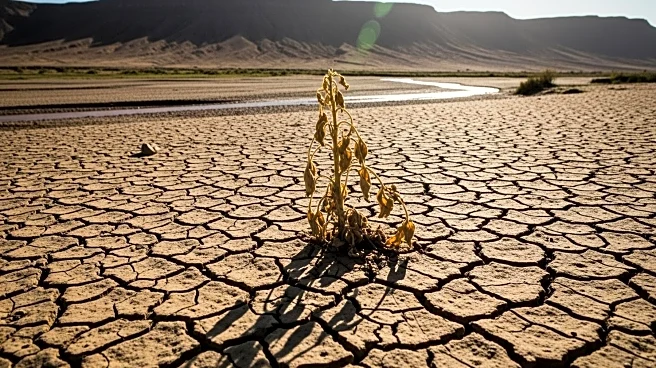What is the story about?
What's Happening?
Iran is grappling with a severe water crisis exacerbated by climate change, government mismanagement, and international sanctions. The country has been experiencing a prolonged drought, with rainfall levels significantly below average, leading to critically low water levels in dams and groundwater reserves. The Iranian government, led by President Masoud Pezeshkian, acknowledges the severity of the situation, which has resulted in widespread water shortages, blackouts, and environmental degradation. The crisis is further compounded by excessive water consumption in agriculture and unauthorized groundwater extraction. Efforts to address the issue include plans to halt construction in Tehran and reduce agricultural water use.
Why It's Important?
The water crisis in Iran has far-reaching implications for the country's economy, environment, and social stability. Agriculture, which consumes a significant portion of Iran's water resources, is a major economic sector, and any reduction in water availability could impact food production and livelihoods. The environmental consequences, such as land subsidence and the drying up of lakes, threaten Iran's natural heritage and biodiversity. Additionally, the crisis highlights the challenges faced by countries in arid regions as they confront the impacts of climate change. The situation underscores the need for sustainable water management practices and international cooperation to address environmental challenges.
What's Next?
Iran's government is under pressure to implement effective water management strategies and reduce reliance on water-intensive agricultural practices. This may involve transitioning to less water-dependent crops and improving irrigation efficiency. The international community may also play a role in providing technological and financial support to help Iran address its water challenges. As the crisis continues, there is a risk of social unrest and increased migration from affected areas, which could further strain the country's resources and infrastructure.
Beyond the Headlines
The water crisis in Iran raises ethical and political questions about resource management and the impact of international sanctions on environmental sustainability. It also highlights the importance of integrating traditional knowledge with modern technology to develop resilient solutions to climate challenges. The situation serves as a warning to other countries facing similar environmental pressures, emphasizing the need for proactive measures to mitigate the effects of climate change.















